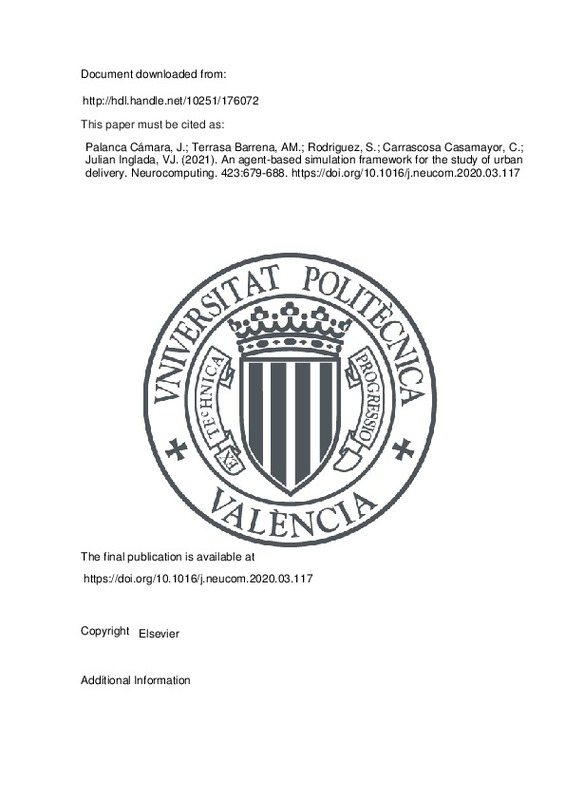JavaScript is disabled for your browser. Some features of this site may not work without it.
Buscar en RiuNet
Listar
Mi cuenta
Estadísticas
Ayuda RiuNet
Admin. UPV
An agent-based simulation framework for the study of urban delivery
Mostrar el registro sencillo del ítem
Ficheros en el ítem
| dc.contributor.author | Palanca Cámara, Javier
|
es_ES |
| dc.contributor.author | Terrasa Barrena, Andrés Martín
|
es_ES |
| dc.contributor.author | Rodriguez, S.
|
es_ES |
| dc.contributor.author | Carrascosa Casamayor, Carlos
|
es_ES |
| dc.contributor.author | Julian Inglada, Vicente Javier
|
es_ES |
| dc.date.accessioned | 2021-11-05T10:17:44Z | |
| dc.date.available | 2021-11-05T10:17:44Z | |
| dc.date.issued | 2021-01-29 | es_ES |
| dc.identifier.issn | 0925-2312 | es_ES |
| dc.identifier.uri | http://hdl.handle.net/10251/176072 | |
| dc.description.abstract | [EN] In recent years, cities and especially urban mobility have undergone remarkable changes. Significant advances in technology have been translated into new mobility services for both goods and people. One evident change has been the transformation of traditional vehicle fleets into more open fleets, in the sense that their members can proactively decide whether or not they are part of a certain fleet and whether or not they perform certain services. Fleets of this type make the decision-making process to be highly distributed, and rule out some of the typically centralized decisions. The management and control of this type of open fleets is severely more complex and, for this reason, the availability of simulation tools that allow for their analysis can be very useful. In accordance with this, the main contribution of this work is the development of an agent-based simulation tool specifically designed for the simulation of new urban mobility models. In this way, the tool can simulate any type of fleet in different urban scenarios, including a solution of the Last Mile Delivery problem, which is also included as a proof of concept in this paper. (C) 2020 Elsevier B.V. All rights reserved. | es_ES |
| dc.description.sponsorship | This work was partially supported by MINECO/FEDER RTI2018095390-B-C31 of the Spanish government. | es_ES |
| dc.language | Inglés | es_ES |
| dc.publisher | Elsevier | es_ES |
| dc.relation.ispartof | Neurocomputing | es_ES |
| dc.rights | Reserva de todos los derechos | es_ES |
| dc.subject | Multi-agent systems | es_ES |
| dc.subject | Coordination | es_ES |
| dc.subject | Smart cities | es_ES |
| dc.subject.classification | LENGUAJES Y SISTEMAS INFORMATICOS | es_ES |
| dc.title | An agent-based simulation framework for the study of urban delivery | es_ES |
| dc.type | Artículo | es_ES |
| dc.identifier.doi | 10.1016/j.neucom.2020.03.117 | es_ES |
| dc.relation.projectID | info:eu-repo/grantAgreement/AEI/Plan Estatal de Investigación Científica y Técnica y de Innovación 2017-2020/RTI2018-095390-B-C31/ES/HACIA UNA MOVILIDAD INTELIGENTE Y SOSTENIBLE SOPORTADA POR SISTEMAS MULTI-AGENTES Y EDGE COMPUTING/ | es_ES |
| dc.rights.accessRights | Abierto | es_ES |
| dc.contributor.affiliation | Universitat Politècnica de València. Departamento de Sistemas Informáticos y Computación - Departament de Sistemes Informàtics i Computació | es_ES |
| dc.description.bibliographicCitation | Palanca Cámara, J.; Terrasa Barrena, AM.; Rodriguez, S.; Carrascosa Casamayor, C.; Julian Inglada, VJ. (2021). An agent-based simulation framework for the study of urban delivery. Neurocomputing. 423:679-688. https://doi.org/10.1016/j.neucom.2020.03.117 | es_ES |
| dc.description.accrualMethod | S | es_ES |
| dc.relation.publisherversion | https://doi.org/10.1016/j.neucom.2020.03.117 | es_ES |
| dc.description.upvformatpinicio | 679 | es_ES |
| dc.description.upvformatpfin | 688 | es_ES |
| dc.type.version | info:eu-repo/semantics/publishedVersion | es_ES |
| dc.description.volume | 423 | es_ES |
| dc.relation.pasarela | S\414588 | es_ES |
| dc.contributor.funder | AGENCIA ESTATAL DE INVESTIGACION | es_ES |
| dc.contributor.funder | European Regional Development Fund | es_ES |







![[Cerrado]](/themes/UPV/images/candado.png)

